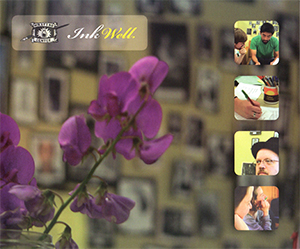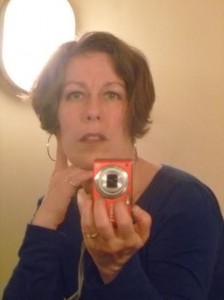
Cover of the first Inkwell, 2006.
Editor’s Note: The Writing Center, located in the Library building just off Red Square, is the creative home of Inkwell, A Student Guide to Writing at Evergreen. In this interview, Writing Center publications editor Thane Fay, ’13 talks with Inkwell co-founders Shaun Johnson, ’07 and Victoria Larkin, ’07 about the history of this student publication.
This is the first of a series exploring the Inkwell project and how students, faculty, and alumni can benefit from its influence on Evergreen’s writing culture.

Inkwell cover 2012
Inkwell is written, edited, and designed entirely by Writing Center peer tutors, students dedicated to helping others find their voices through the writing process. Each year, authors discuss writing specific to Evergreen—such as seminar papers, evaluations, and academic statements—as well as exploring themes like developing a writing process, finding your voice as a student writer, and learning tools for academic and creative writing. With its emphasis on cultivating student voices and creating a culture of student empowerment in academics, Inkwell inspires student writers to think about how they write and invites them to become part of the Writing Center community

Inkwell cover 2008
Inkwell co-founder Shaun Johnson, ’07 reflected that “Evergreen puts incredible emphasis on writing in curriculums across disciplines, so it seemed especially appropriate to draw a map for students to navigate.” Inkwell was created to be this kind of map.
The Writing Center distributes over a thousand free copies of Inkwell annually, both on campus and to the wider community. Inkwell co-founder Victoria Larkin ‘07 sees the publication as providing “a common ground, a jumping off place for conversations,” inspiring writers to “go into and beyond their preconceptions of the writing process, of writing in general, and of their own abilities.”
Learn more about The Writing Center. Read digital copies of past editions of Inkwell.
Thane Fay (TF): What can you tell us about the beginnings of Inkwell and your history with the project?

Inkwell co-founder Shaun Johnson, ’07.
Shaun Johnson (SJ): Sandy [Yannone, Director of the Writing Center] and I developed the initial idea for Inkwell. … My idea for the publication had its roots in my experience collaborating with some friends on [the Evergreen Political Information Center]’s 2005 Disorientation Manual. It hit me that Evergreen had orientation material for a number of things—so why not writing? I walked into Sandy’s office and proposed the idea for a tutor-created publication about writing at Evergreen. The publication would be authored from cover to cover by the Center—tutors would write it, design it, print it, and distribute it. We would need to create processes for designing, writing, editing, and funding. The idea ignited at the Center and tutors were excited to take the helm.

Inkwell co-founder Victoria Larkin, ’07
Victoria Larkin (VL): … I remember that Shaun became immersed in the design and page layout, and somehow haphazardly a group editorial board formed. With the intention of sharing duties, a few of us arrived at a complex system of parsing out editing, proofing, and communicating with authors. I’m not sure how I wound up as part of that, other than my natural eagerness to be involved in such a project. The group edit became a set part of the way Inkwell went, for most of the volumes that followed.
TF: What were the initial goals of the Inkwell project?
VL: To create a vehicle through which we as tutors could share our philosophy and provide some inspiration, encouragement, and assistance to everyone on campus; also to extend an invitation into the Writing Center.
SJ: Inkwell was pitched as an introduction to students’ writing at Evergreen, and as a constructive way to spread awareness of the Center and its work. Evergreen puts incredible emphasis on writing in curriculums across disciplines, so it seemed especially appropriate to draw a map for students to navigate. … Since the content for Inkwell would come from tutors, Inkwell became a fantastic opportunity for inter-center tutoring and to walk the walk, so to speak. Inkwell would be a vehicle for sharing tutor voices and creating valuable discussions on campus. Benefits to Evergreen—as well as the Center—went on and on.
TF: What did you gain from your work with Inkwell?
SJ: Uncharted riches. I gained deeper connections to my mentors, colleagues, and friends. I became a much better designer… I learned how to steward a publication through its entire lifecycle—from its first words to the moment of intrigue on writers’ faces when they picked up a new edition.
VL: Validation about my ideas [in regard to] autonomous [and] collaborative creations: that it is possible to maintain and express individuality while working in and creating in community. Experience working with others who are dedicated to achieving the best for all, without letting egos rule; and experience of leadership that cultivates and motivates, guides, steadies, and encourages (thank you for spoiling us all, Sandy Yannone!). Everlasting good karma.
TF: How has the work you did with Inkwell shaped your life as alumni?
SJ: Inkwell was a simple, timely idea that took on a life of its own and flourished through shared interests, passionate people, and a healthy, collaborative spirit. It gains momentum and vision with every new volume, reaching new audiences and creating new connections for the Center. The success of Inkwell over the years has certainly shown me the value of embracing ambitious ideas and working with others to accomplish more than one is capable on their own.
VL: … The resonance from my “Tutoring as a Radical Act” essay has been so strong [that] it is an undeniable fact that my experience as a tutor, my writing about it, and Inkwell coming into being has positively affected many other lives. There’s a ripple effect there, as I believe there is with tutoring. Tutors go into the world and bring with them this way of being … an open way, a way of listening, of vigorous thinking and questioning, a dialogic way of entering into all relations, sharing knowledge and wisdom, cultivating the unique voices of all.
TF: Why do you think a project like Inkwell is important for the Evergreen community? What does it provide Evergreen students, alumni, faculty, staff, and other community members?
SJ: Any and all opportunities to share student voices are invaluable for the deeper health of Evergreen. But more than this, Inkwell promotes a culture of creativity, collaboration, and expression.
VL: Inkwell is structured to be part inspiration and part go-to manual, to offer perspectives on what a writing process might include, and to invite engagement with the content. It is especially suited to Evergreen, given the focus on written evaluations instead of grades, given that programs expect college-level writing without having English 101 classes, and because the Writing Center is such a focus for writing cultivation and assistance.
Inkwell is given to the entire campus and even finds its way to the wider community, and can become a common ground, a jumping off place for conversations; it can inspire writers to go into and beyond their preconceptions of the writing process, of writing in general, and of their own abilities.
Inkwell is a peer publication; it is not condescending, but opening the door to all, saying Hey, We are All Writers Here.
VL: Inkwell exposes the Writing Center and its work to students, and uncovers the depth of what the Center offers. Readers who are less familiar with the Center are inspired by tutor writing, and begin to see the Center as a place for creativity as well as mechanics. Inkwell creates new connections between the Center and communities on campus, and cultivates conversations that are relevant to people’s lives at Evergreen. In addition to this, Inkwell is a collaborative project that strengthens bonds between members from all areas of the college. It’s a way to celebrate writing, the Center, and its values by creating conversation and inviting dialogue.
About the interviewees:
Victoria Larkin, ’07 graduated with a BA in Expressive Arts. She was one of the founding members of Inkwell, served as the editor of Inkwell Volume 4, and authored six pieces for Inkwell, including “Tutoring as a Radical Act: Changing the World One By One” and “On Your Marks: Accentuating Elegance (Set in Type, Not in Stone).” She says she’s “still writing, still tutoring, grad school soon!” See more of her work at victorials.wordpress.com.
Shaun Johnson, ’07 graduated from Evergreen with a focus in Environmental History and Human Ecology. Shaun was the editor of Inkwell Volume 1, authored the article “Questions of Travel,” and did visual design for Inkwell Volumes 1 and 5. He is now a freelance designer living in Seattle, Washington. You can reach him at shaun.johnson.design@gmail.com.
About the author:
Thane Fay ’13 graduated from Evergreen with a focus in Writing and History. As a student, Thane was a peer writing tutor at the Writing Center, did visual design for Inkwell Volume 8, and wrote the article “Use Your Words: Making Room for Agency in the Feedback Process.” Now the Publications Editor at the Writing Center, Thane coordinates the Inkwell editorial board, does visual design for the Inkwell digital archive, and writes pieces like the one you just read.


Pingback: Writing in Collaboration: The Student Editors Who Create Inkwell | The Evergreen Mind